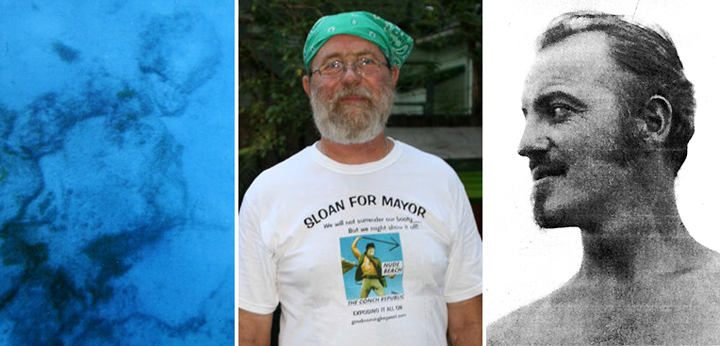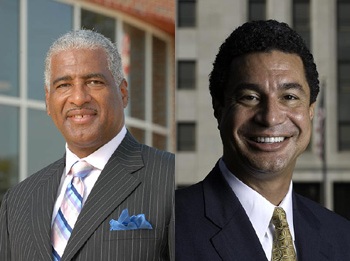Editor’s note: The following remarks were written and presented by Ed LaMonte at this year’s MLK Unity Breakfast here in Birmingham, AL on January 18, 2010. We felt the need to provide the text here as well as a link to a piece published in Sunday’s Birmingham News by current city schools interim superintendent Barbara Allen. We try to provide some context on our site’s front page . – ACN
DR. MARTIN LUTHER KING, JR. UNITY BREAKFAST
JANUARY, 18, 2010
WHY WE CAN’T WAIT
WHERE DO WE GO FROM HERE?
Old professors may retire, but they rarely stop giving assignments. I will be giving you two assignments this morning.
Many of you probably know that I am a back-up speaker, and I am proud and grateful to be in that role. The breakfast planners had hoped to have Dr. Regina Benjamin, recently sworn in as Surgeon General of the United States, with us, but her overwhelming schedule prevented her from attending. We can all be proud that this native Alabamian occupies such an influential position in the health care arena. Her life, her values, and the remarkable contributions she has made to health care place her squarely in the tradition of Dr. King and what he stood for. For those of you who are not familiar with Dr. Benjamin’s story, my first assignment for you is to learn about this exemplary public servant and be grateful for her leadership at this critical moment in health care.
As we reflect today on the meaning of Dr. King to our own city, to the nation, to the world, and to us as individuals, I want to assess critical aspects of our community in 2010 to see where we stand in meeting some of the challenges he issued us.
In 1937, Harper’s Magazine published a lengthy commentary on Birmingham, regarded by local residents as “The Magic City”, a unique American city poised on the edge of municipal greatness. But to the chagrin of most locals, correspondent George R. Leighton entitled his article, “Birmingham, Alabama: The City of Perpetual Promise.” Instead of documenting the city’s undeniably impressive physical development, he emphasized its equally undeniable short comings and the causes of the unfulfillment of the perpetual promise.
Dr. King and the Southern Christian Leadership Conference came to Birmingham in 1963 to assist the Rev. Fred Shuttlesworth and others in achieving a portion of that perpetual promise. One year later, Dr. King published an account of Birmingham and the challenges that urgently needed to be addressed in our city and throughout the nation; he entitled his book, “Why We Can’t Wait.” In 1967, he again addressed the future of America, and our city, and asked, “Where Do We Go From Here: Chaos or Community?”
Today Birmingham stands at another crossroads at this beginning of a new year and a new decade. Tomorrow many of us will go to the voting booth to elect a new mayor for our city – the fourth person to occupy that office in as many months. The new mayor will face a municipal financial crisis which is, I fear, not well understood by the public at large and which will set severe limits on his ability to lead us forward.
But at least we can expect both some stability in that office after a prolonged period of turmoil and blessed relief from the present campaign. Soon we expect to have a new superintendent of Birmingham Public Schools.
At this time of new beginnings, I hope to issue a clarion call to a faltering community, arguing that in critical areas our promise remains unfulfilled, that we do not have the luxury of time to wait, and that the question is an open one as to where we go from here. I will focus on only two topics this morning: our ability to function as a community in addressing regional topics that affect the lives and well being of all our citizens and the challenges confronting us in meeting the education needs of our city’s children.
When Dr. King led the Civil Rights Movement in Birmingham in 1963, there were 31 municipalities in Jefferson County; local leaders had by that date identified political fragmentation in the metropolitan area as a pressing issue which, if unaddressed, would thwart our progress. Today, there are not 31 but 38 municipalities in the county; moreover the metropolitan area – in fundamental ways a single economic community – is now defined as including 7 counties and 94 municipalities. The question is, do we have any stable, predictable means for defining regional problems and developing responses, including the necessary funding to address these problems. Sadly, the answer is no. The next question then becomes, does this political fragmentation have a negative impact on the lives of citizens, and especially those for whom Dr. King was a strong advocate? In the now famous words of Sarah Palin, the answer is, “You betcha!”
A prime example of this problem is the much discussed reality of our deplorable public transit system. I well recall the first meeting of the Community Affairs Committee of Operation New Birmingham that I attended in the fall of 1969, shortly after I began my career with the Center for Urban Studies at UAB. The CAC then had 27 members: 9 representing local governments, 9 the private sector, and 9 the African American community. The two topics at the top of CAC’s agenda over 40 years ago were adequate housing for low income families and adequate public transportation. Illustrative of the cost of our failure is the fact that most of the $87.5 million for a Birmingham Transit Corridor, secured by Senator Shelby in 1998, has been left on the table because of the inability of local leaders to secure the required 20% match or to establish an ongoing, reliable, annual operating source of funds. As a result, the transportation options for all of us are limited, with the heaviest burden born by those who have no regular alternative to public transit; and our environment is unnecessarily polluted in the process.
Turning to education: when Dr. King led the Movement here in 1963, the latest census recorded a population for the city of Birmingham of over 340,000; more than 70,000 students attended the Birmingham Public Schools. The latest Census Bureau estimate of the city’s population was 228,798 in 2008, with about 28,000 students enrolled in the city school system. The city is steadily moving down a path toward having a population under 200,000; several hundred students leave the Birmingham schools each year to pursue other educational options, or perhaps none.
The Birmingham News reported on December 21, 2009 that the high school graduation rate for the Birmingham Public Schools is 83%. Statistics are often very unreliable, given the differing ways that data can be organized and presented. The venerable and highly respected Southern Education Foundation has conducted studies of high school drop outs in Alabama, defining a drop out as a student who begins ninth grade but does not graduate – a definition now uniformly required by the U.S. Department of Education. The Foundation’s study, after adjusting for students physically leaving the city or transferring to private schools, establishes Birmingham’s dropout rate in 2008 as 50%.
Dropping out clearly limits any young person’s ability to achieve his or her full potential in many areas of life, with income a clear indicator of this fact. The Southern Education Foundation documented that in 2008, the adult mean annual earnings for a Birmingham dropout were $15,803; for high school graduates with no further education, the mean was $21,991. Therefore, high school graduation accounts for, or at least
correlates with, an income that exceeds that for a dropout by nearly $6,200 per year, almost 40% higher. With heart-breaking sadness, we can assume that most high school dropouts in the 21st century will live severely stunted lives and be an economic drag on the local economy. And for some as yet unexplained reason, a Birmingham dropout’s income is nearly $3,000 per year less than the adult median annual earnings for high school dropouts for Alabama as a whole.
And so many look forward to the arrival of a new superintendent. Let me put the superintendency in the context of our city. First, the previous and present boards of education have pursued a search process that has prompted widespread local skepticism and unprecedented negative comments by two knowledgeable observers. Both are our own greatly admired Dr. Ethel Hall, Vice Chair of the Alabama State Board of Education, and Dr. Michael Casserly, Executive Director of the nationally respected Council of Great City Schools, have publicly stated that the ongoing search is so flawed that it should be abandoned and a new search begun.
Also sobering is the fact that research by the Council of Great City Schools has established that the average tenure of an urban school superintendent is now about 3.5 years; in the past 15 years, Birmingham has had six different leaders. I well remember when, as Interim Superintendent, I attended a meeting of the Council of Great City Schools in Wichita, Kansas. The mayor of Wichita welcomed us to his city, saying that he was happy to have in Wichita the highest paid group of migrant workers in America. We should not expect to be so fortunate as to have a new superintendent who will fix our system. I sadly conclude that we adults of this city have let down our children, and we must – in my view – assume much greater responsibility for their education. It was, after all, for the children of the future that Dr. King held such high hopes.
Let me assure you that it gives me absolutely no pleasure to stand before you and make such critical comments on the occasion of this Unity Breakfast celebrating and honoring Dr. Martin Luther King, Jr. But I firmly believe that Dr. King would be deeply disappointed in the Birmingham of 2010. And I do not want to “beat up” on this city where I have chosen to live my adult life and raise a family without offering some specific suggestions – some modest food for your thought.
Regarding encouraging a regional way of thinking about and responding to common concerns, I want to point to two organizations that are already in place, staffed, and led by respected professionals: the Regional Planning Commission of Greater Birmingham, led by Charles Ball, and the Public Affairs Research Council of Alabama, Jim Williams, Executive Director. I have talked with both men, and they are prepared to discuss how their organizations can play larger roles in addressing the needs and opportunities of regionalism. I very strongly recommend engaging them in such discussions.
Regarding public education in the city, we clearly need to support the new
superintendent and current board when they have earned such support, as we must support principals, teachers, and especially children. A promising development in 2009 was establishing a local education foundation to secure needed financial support for the Birmingham Public Schools – an effort led by the Community Foundation of Greater Birmingham, certainly a leading voice in our area for both regionalism and public education. However, I today want to urge that our community create or identify an organization with the single purpose of monitoring carefully our public education system as an advocate for the students – an ombudsman role in behalf of those for whom Dr. King voiced such high hopes and aspirations. My personal instinct is to turn initially to Greater Birmingham Ministries for leadership in this area.
My second assignment for you today is to act individually in some specific way to support at least one student in his or her education – by being part of the adopt-a-school program, tutoring, reading to, or perhaps simply writing or calling a young person to express your interest and encouragement.
To finish, I realize that I could have come before you this morning with comments about significant progress in Birmingham since 1963, especially in race relations, and marvelous programs and institutions in our midst. But, in my opinion, that is not the perspective called for at this critical moment. Birmingham remains a community of great but significantly unfulfilled potential. We can’t wait to take immediate and significant steps. The question is, where do we go from here?
 Is parking availability really a major issue in Birmingham, AL?
Is parking availability really a major issue in Birmingham, AL?





 The “
The “

Ac-Cent-Tchu-Ate the City Positive
I’d recently walked across the 21st Street Viaduct, looked down and noticed a great deal of garbage and debris inside of it. It disturbed me because I’d taken part in one of several clean-ups of the stretch of land while I was a resident of the Birmingham’s Central City neighborhood.
I suggested to the individual that it was probably time to organize another clean up the space again, perhaps engaging a new group of concerned individuals in the process while they suggested that perhaps a phone call to the city to do so would be better while finding another way to get citizens involved, like a charrette.
When I asked why, he said that it would most likely be the same group of folks who always came out that would do the clean up again since it probably wouldn’t attract any new people.
I’ve got a feeling that people visiting Railroad Park in September who’ve still haven’t heard of it as of yet (and live in metro Birmingham) could be motivated to clean up a piece of property for the first time if invited.
Perhaps we’ve become so accustomed to seeing the usual suspects all of the time that we don’t always think of new ways to reach out to more people and engage them as well (maybe even using some of the same things that don’t work on the usual suspects anymore).
Maybe it’s because it appears to some that others are always looking for something to complain about or they immediately have a negative reaction to any idea that is presented to them – for no really good reason. If you hang around a lot of people like that long enough, it tends to rub off on you too…
I write those last statements knowing that the majority of the voices that we normally hear online are those of a small minority made vocal due to the majority not necessarily wanting to share their opinions.
It would be nice to hear more of those optimistic and positive voices across more of the platforms that we use for communication here in Birmingham, AL. There are some people that need to hear from others like them; from imagining what this portion of Jones Valley can be in a few short years. Luckily, there are a few of them online (and offline – that you will run into every once in a while.
I was also over there scouting out a potential location for the office/collaborative space that I’ve talked about before on these virtual pages (BTW – the survey results and other news regarding that project will be posted on Monday morning – along with a few other minor changes to the site in general).
As I parked I noticed that the space that I was heading over to stare into again was in fact open, leading to one of those weighted moments where you’re thinking “I know there are other places there but…” That feeling went away when I figured out that the person leasing the space was a long time champion for the neighborhood.
His plans for the space reminded me of the hope that I used to hear from merchants and residents in parts of this city that many of the folks in the know actually don’t know. One of the great things about my former job was the level of passion that you could feed off of after a conversation with a property owner who’d been there for 50+ years or a new business that wanted to be where they were because they truly believed in the city’s future. It’s something I’m beginning to find again as the site begins to churn out content again.
Getting back in a positive frame of mind is one way to combat the “we’ll never do better” attitude. As more things come online those here in Birmingham, AL will learn to once again accentuate the positive (and eliminate the negative).
André Natta is the stationmaster for bhamterminal.com.
Photos:
Birmingham Railroad Cut – East End. Curtis Palmer/Flickr
Avondale Brewing Company under construction. Courtesy of their fan page on Facebook.
1 Comment
Posted in Commentary
Tagged AL, Alabama, attitude, bham, Birmingham, Commentary, essay